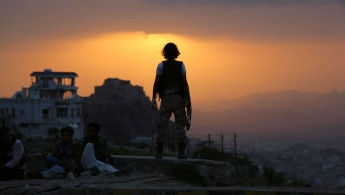Where does Yemen's Taiz stand, eight years after the uprising?
Recalling the rise of the popular voices and the insurmountable zeal for change, the 30-year-old Sharabi called the protests the "crucial awakening" that sought to better Yemen politically and economically. However, hopes have evaporated while war has thrived.
The country lies in tatters and is become known as the word's largest humanitarian crisis. But this painful reality in Yemen has not changed Sharabi's opinion of the uprising. He says he never regrets his participation in the 2011 protests that demanded the removal of the late president Ali Abdullah Saleh's regime.
Thousands of people in Taiz - including Sharabi - took to the streets on February 11, marking the anniversary of the uprising that ended up toppling Saleh's 33-year rule. The euphoria among participants was obvious as the participants raised placards and chanted slogans, showing their pride that they took the lead in effecting change.
Taiz, one of the most populated cities in Yemen, is still beset by dire humanitarian circumstances and an unstable security situation. But that didn't stop the town from celebrating the anniversary.
Twitter Post
|
The UN estimates the war's death toll at 10,000 since 2015, the year in which the country slid into a civil war after the collapse of the political process. The civil strife has been doubled by a foreign military intervention spearheaded by Saudi Arabia and the UAE. This complicated conflict has given birth to a myriad of humanitarian tragedies including famine and epidemic outbreaks that have also claimed thousands - perhaps tens of thousands - of lives.
Relentless struggle
On Saturday, mass protests flared up in Taiz, calling on the legitimate government of Yemen and the Saudi-led Arab coalition to quicken the liberation of Taiz province from the Houthis. They also demanded the implementation of December's UN-sponsored agreement on ending the Houthi siege of Taiz.
Civilians here have been struggling relentlessly for better conditions in a province that has been beset with fighting and sieges over the past four years.
Mukhtar Almaleek, a 34-year-old resident of Taiz, said the people had not seen any real relief from war in that time, adding that all civilians have borne the brunt of this tragic situation in line with the tough economic status, military escalations and repeated failures of peace talks.
"We [civilians] are caught between the callousness of the Houthis and the negligence of the government and the Arab coalition," he told The New Arab. "This city has paid a heavy price, and it seems it will continue to pay dearly. Neither the Houthis have been driven out of Taiz nor the government-backed factions are united. Due to these circumstances, the situation in Taiz is still complicated and volatile," Almaleek said.
Taiz was an epicenter of the 2011 protests, and lots of people here take pride in being known as "revolutionaries". However, the scars left by the war are everywhere in the city. Basic services including education, health and electricity have been disrupted. Shelling has been recurring as security worries have not been fully addressed.
According to the Coalition of Humanitarian Relief-Taiz, the war had killed 3,863 and wounded 17,293 in Taiz up to November last year. In addition, 4,303 houses, government and private facilities had been either damaged or totally destroyed. The Coalition estimates the number of displaced families at 179,567.
Twitter Post
|
The cost of war in Taiz has been horrendous, and no uprising enthusiast in 2011 could have envisioned where Yemen stands today. "We are proud of the 2011 uprising, but we have not been satisfied, without its results so far," said Local resident Sharabi.
"We sought change for the better, and we did not imagine this destruction would happen."
Where is Taiz heading?
Four years into the fighting, there appears no end in sight - either in Taiz or nationwide. Presently, Taiz is still divided between the Iran-backed Houthis and the Saudi-backed government, and armed clashes could erupt at any time.
Sporadic shelling has taken a heavy toll on civilians and disturbed the lives of many families. Lots of civilians, particularly in the most conflict-stricken areas of Taiz, have no clue of what may lie in store.
Taiz province comprises of 23 districts; the majority of the territory is under the control of the Yemeni government. The Houthi group still has a presence in seven districts.
Mohammed al-Ghabiri, a Yemeni political analyst, said it was difficult to predict an accurate scenario in Taiz as continuing political and military developments usher in new circumstances. According to Ghabiri, the best scenario is "liberation".
"Taiz should be liberated and the government should consolidate its authority. Some local and regional powers work to disintegrate the unity of the pro-liberation forces. They intend to create and nurture the conflict in order to block its liberation. Those parties that benefit from the ongoing scenario in Taiz are the Houthis, the UAE and the southern separatists," said Ghabiri.
The UAE has been known for its hostility towards the Muslim Brotherhood in Yemen and other Arab countries. The Brotherhood has a strong base of support in Taiz, and this has influenced the UAE's approach here.
"The situation seems to persist unchanged, unless the legitimate government has a clear and decisive vision on what it wants to see in Taiz," said Ghabiri.
The author is a Yemeni journalist whose identity we are withholding for their protection.
Follow us on Twitter: @The_NewArab



